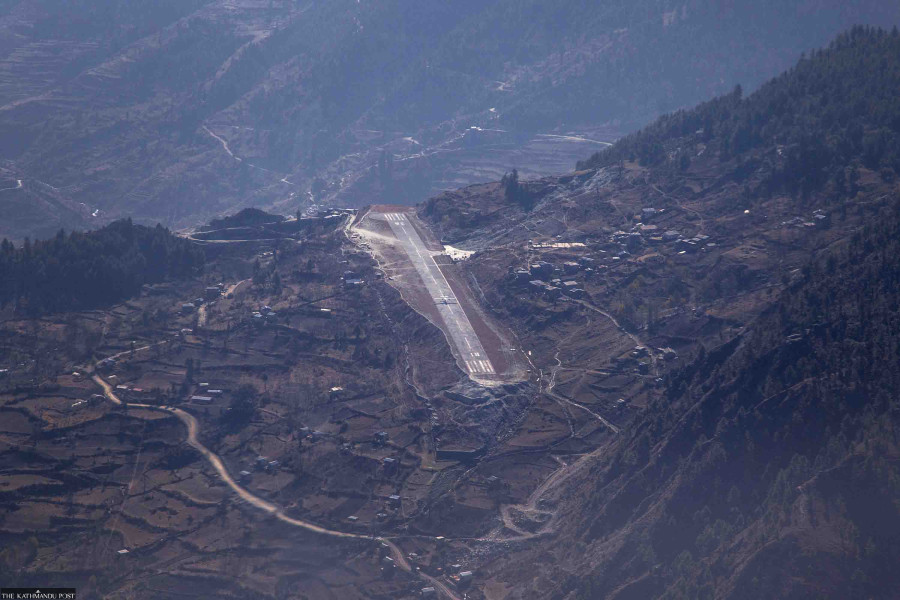Money
Karnali tourism entrepreneurs demand fair and equal treatment
The civil aviation body had recently barred airlines from flying to the Karnali region after 12 pm citing safety reasons.
Subin Adhikari
The travel and tourism entrepreneurs of Karnali on Friday criticised the government for acting indifferent towards Karnali’s citizens, particularly when it comes to air connectivity.
In response to the civil aviation body, which had recently barred airlines from flying to the Karnali region after 12 pm citing safety reasons, the tourism entrepreneurs from Karnali arrived in Kathmandu to apprise the government that all citizens are equal.
Bowing to the pressure, the civil aviation body, which has been making frequent ad-hoc decisions, rolled back its decision on Thursday.
Karnali province comprises of ten districts–Salyan, Surkhet, Dailekh, Jajarkot, Rukum West, Kalikot, Jumla, Dolpa, Mugu and Humla.
“Karnali has the potential of prospering from tourism, but the government’s outdated and shortsighted policies are keeping domestic and foreign tourists away,” said Devi Krishna Rokaya, president of Karnali Tourism Entrepreneurs Society.
“Due to the impractical policies of the government, Karnali has not prospered.”
The entrepreneurs of Karnali say provisions such as higher flight tickets for foreigners, special permit rates for the tourists entering the district of Karnali, and delay in issuing permits for tourists visiting Karnali are discouraging tourists.
According to the entrepreneurs, the cost of a return flight ticket from Kathmandu to Simikot in Humla via Nepalgunj and back to Kathmandu costs up to $730 to $750 for a foreigner.
But the price for Nepali on the same route costs Rs28,000.
“Such discrimination in fare discourages tourists from visiting Karnali, this needs to be rationalised,” said Rokaya.
In addition to that, each tourist visiting Upper Dolpo needs to pay $500 for a 10-day permit.
After the first 10 days, they need to pay $50 per day.
Similarly, tourists visiting Humla and Lower Dolpa also need to pay $50 and $20 respectively for a week of trekking permit.
Junga Lama, past president of Karnali Tourism Entrepreneurs Society, said that these districts bordering China were declared restricted areas when China invaded Tibet in 1950 to keep the Tibetan infiltrators away from entering Nepal.
However, in October 1991, the government started allowing tourists to visit by taking special permits from the Department of Immigration.
“But the tourism industry has changed much from the 90s, the government should make Karnali accessible for mass tourism by lowering the permit fee and making the process to get a permit online,” said Lama.
In addition to that, while an individual tourist can visit any other place in the country by taking a guide and even without taking a guide in some areas, the government has made it mandatory for tourists to be in a pair or more to visit the restricted districts.
“These kinds of impractical rules only make the trip to Karnali a hassle and costlier,” said Lama.
“Besides these permits, a tourist needs to spend an additional $2,000 to $3,000 on logistics as Karnali lacks adequate infrastructure to accommodate tourists. Due to this exorbitant cost, tourists prefer to go to other destinations.”
The traders at Karnali are worried that due to the poor development of infrastructure in Karnali, they aren’t able to attract domestic tourists as well.
According to local traders, it takes two days to reach Rara in Mugu from Surkhet via the Karnali Highway.
“Although the distance is just 300 kilometres, due to the poor condition of the road, both the cost and length of travel increases,” said Yangjor Lama, treasurer of Karnali Tourism Entrepreneurs Society.
“If the government focused on upgrading the Karnali Highway, the living conditions and tourism sector would prosper in Karnali.”
In addition to this, the local traders also criticised the recent decision by the Civil Aviation Authority of Nepal to restrict sling flights, cargo flights, and overnight stays of helicopters in rural areas.
“Air connectivity is the lifeline of Karnali where the road networks are at a rudimentary stage. All the food items, medicines, patients, dead bodies and construction materials are transported using aircraft,” said Lama.
“The civil aviation body's recent blanket ban on these fights is making the life of people in Karnali difficult. We are afraid that it will further decrease the number of tourists, which is already low.”




 21.3°C Kathmandu
21.3°C Kathmandu














